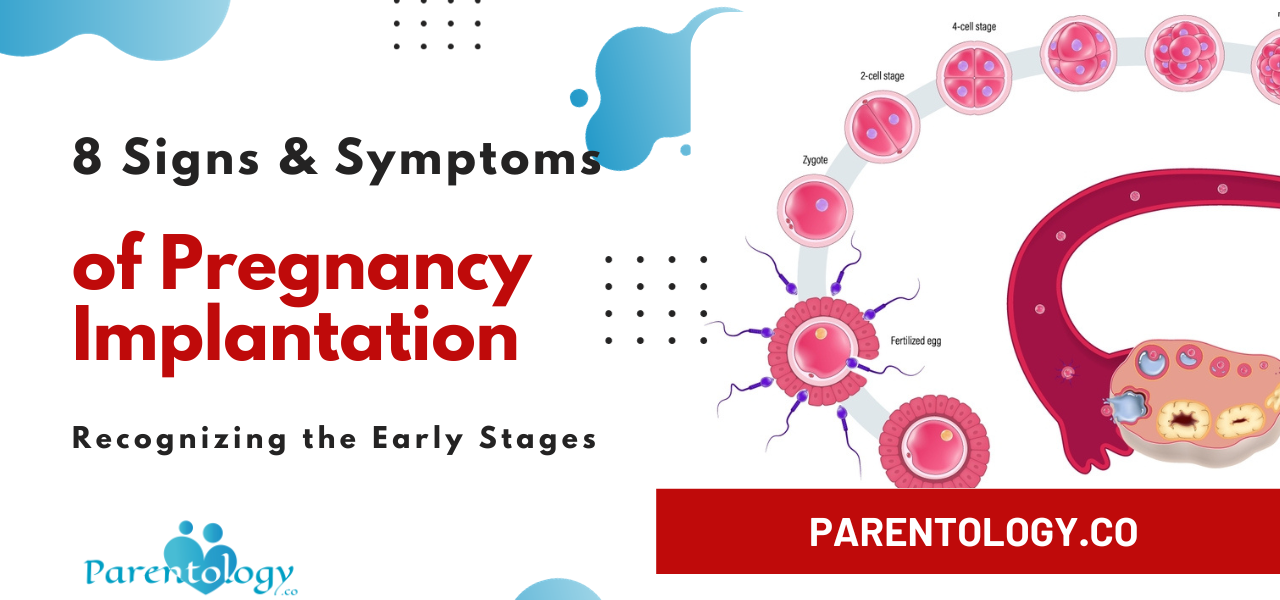8 Early Signs And Symptoms Of Pregnancy Implantation: Recognizing the Early Stages
Pregnancy is a journey marked by various milestones, and one of the earliest indicators of this incredible journey is implantation. Often occurring about 6-12 days after conception, implantation marks the attachment of the fertilized egg to the uterine lining. Recognizing the signs and symptoms associated with implantation can offer invaluable insight for those eagerly awaiting news of a possible pregnancy.
Understanding these early signals is essential, as they can often be confused with regular menstrual symptoms or overlooked entirely. Let’s delve into the intricacies of implantation symptoms and explore the 8 telltale signs that could signal the beginning of a remarkable journey toward parenthood.
When Does Implantation Occur?
Implantation typically occurs about 6-12 days after conception. This crucial stage marks the attachment of the fertilized egg to the uterine lining, initiating the early stages of pregnancy. Understanding the timing of implantation can help recognize the subsequent symptoms.
1. Spotting or Light Bleeding
Implantation bleeding is one of the primary signs, usually experienced 10-14 days after conception. This light spotting differs from menstrual bleeding and may last for a few hours to a couple of days.
2. Cramping Sensation
Mild cramps resembling menstrual cramps may occur during implantation. These cramps might be accompanied by lower back pain or discomfort, indicating the embryo’s attachment to the uterus.


3. Changes in Basal Body Temperature
Some women notice a slight increase in basal body temperature during implantation. This subtle change can be an early clue to the onset of pregnancy.
4. Changes in Breast Sensitivity
Heightened sensitivity or tenderness in breasts is a common symptom experienced after implantation. This can be attributed to hormonal changes as the body prepares for pregnancy.
5. Fatigue and Tiredness
Feeling more tired than usual is typical during early pregnancy stages. Implantation triggers hormonal shifts, leading to increased fatigue in many expectant mothers.
6. Nausea and Morning Sickness
While morning sickness is often associated with later pregnancy, some women experience mild nausea during implantation. This symptom varies from person to person.
7. Changes in Appetite or Food Cravings
Implantation might bring about alterations in taste preferences or food cravings. Sudden aversions or cravings can be a sign of hormonal changes.
8. Mood Swings and Emotional Changes
Hormonal fluctuations during implantation can cause mood swings or emotional changes. Feeling more sensitive or experiencing mood variations is common.
Understanding Pregnancy Implantation
Pregnancy implantation is a pivotal stage in conception, occurring when a fertilized egg attaches itself to the uterine wall. This process is essential for a successful pregnancy, initiating the formation of the placenta and the support system for the growing embryo.
How Does Implantation Occur?
After fertilization, the embryo, a cluster of cells, travels through the fallopian tube towards the uterus. Upon reaching the uterus, the embryo seeks a suitable spot to implant itself into the uterine lining. This attachment allows the embryo to receive vital nutrients and support for growth.


Implantation Symptoms vs. Pregnancy Confirmation
Distinguishing between implantation symptoms and confirmation of pregnancy can be challenging. While some women experience noticeable symptoms, others might not have any discernible indications. Taking a pregnancy test after a missed period remains the most reliable method for confirming pregnancy.
Factors Affecting Implantation Symptoms
Several factors can influence the intensity and duration of implantation symptoms. Hormonal variations, stress levels, individual body responses, and overall health play crucial roles in how a woman experiences these symptoms.
Seeking Medical Advice
If you suspect you’re experiencing implantation symptoms or if you’ve confirmed pregnancy, it’s advisable to seek guidance from a healthcare professional. Regular prenatal care is essential for ensuring a healthy pregnancy journey.
Managing Implantation Symptoms
While mild symptoms are typical during implantation, managing discomfort is essential. Prioritize self-care by maintaining a healthy lifestyle, staying hydrated, eating nutritious meals, and getting adequate rest.
Factors Influencing Implantation Success
Successful implantation depends on various factors beyond timing and the embryo’s health. Factors such as the mother’s health, the quality of the embryo, and the uterus’s receptivity significantly impact the implantation process. Conditions like uterine abnormalities, hormonal imbalances, or underlying health issues may affect implantation success.
Implantation Failure and Its Implications
While implantation is a natural process, failures can occur. Implantation failure can lead to difficulties in conceiving or recurrent miscarriages. Understanding the causes behind implantation failure can aid in seeking appropriate medical interventions or fertility treatments.
Implantation and Assisted Reproductive Techniques
For individuals undergoing fertility treatments like in vitro fertilization (IVF), ensuring successful implantation is crucial. Medical advancements and techniques such as embryo transfer optimization, endometrial receptivity analysis, and preimplantation genetic testing aim to enhance the chances of successful implantation.
Healthy Lifestyle Choices for Supporting Implantation
Maintaining a healthy lifestyle is essential for supporting the implantation process. Factors such as regular exercise, a balanced diet rich in nutrients, managing stress levels, and avoiding harmful substances like alcohol or tobacco can positively impact implantation success.
Potential Signs of Concern during Implantation
While most women experience mild symptoms during implantation, certain signs may indicate issues requiring medical attention. Heavy bleeding, severe cramping, persistent pain, or unusual discharge warrant immediate consultation with a healthcare provider.
Emotional Well-being during the Implantation Phase
The journey towards pregnancy, particularly during the implantation phase, can evoke a range of emotions. Dealing with uncertainty, anticipation, and hope can be challenging. Seeking emotional support, communicating with a partner, or joining support groups can provide valuable coping mechanisms.
Role of Hormones in Implantation
Hormonal orchestration plays a pivotal role during implantation. Following ovulation, the hormone progesterone rises, preparing the uterine lining for implantation. Additionally, human chorionic gonadotropin (hCG) produced by the developing embryo supports the maintenance of progesterone levels, essential for a successful pregnancy.
Early Pregnancy Tests and Implantation
The anticipation of confirming pregnancy after implantation often leads to early pregnancy testing. Tests designed to detect hCG levels in urine can provide preliminary results as early as a few days after implantation. However, for accurate results, it’s advisable to wait until after a missed period to ensure higher hCG levels for detection.


Implantation Discomfort and Sensations
While many women experience implantation without notable discomfort, some may describe sensations such as a pulling or tugging feeling in the lower abdomen. These sensations are often transient and mild, lasting for a brief period during implantation.
Implantation and Twin Pregnancies
In cases of multiple pregnancies, such as twins, the implantation process involves the attachment of more than one embryo to the uterine wall. This can result in heightened hormonal changes and increased implantation-related symptoms, though individual experiences may vary.
Medical Interventions for Implantation Support
Individuals facing challenges with implantation may explore various medical interventions. Techniques like hormonal therapies, uterine cavity assessments, or treatments addressing specific underlying conditions aim to improve implantation success rates.
Luteal Phase Support and Implantation
Supporting the luteal phase, the period between ovulation and menstruation, is crucial for implantation success. Medical interventions or supplements that bolster the luteal phase, such as progesterone supplementation, may enhance the chances of successful implantation.
Post-Implantation Care and Monitoring
After implantation, prenatal care and monitoring become essential. Regular check-ups with healthcare providers, prenatal vitamins, and lifestyle adjustments support the ongoing health of both the mother and the developing embryo.
Embracing the Journey
The period surrounding pregnancy implantation is a time of hope, anticipation, and transformation. Nurturing a positive mindset, adopting healthy practices, and seeking professional guidance contribute to a fulfilling pregnancy journey.
Understanding Implantation Symptoms FAQs
Q1. Are implantation symptoms the same for every woman?
A: No, symptoms can vary significantly among women. Some may experience multiple symptoms, while others may have none.
Q2. How long do implantation symptoms last?
A: Implantation symptoms can persist for a few hours to a couple of days, varying in duration and intensity.
Q3. Can implantation bleeding be mistaken for a menstrual period?
A: Yes, as implantation bleeding is often light and occurs around the time of an expected period, it can be mistaken for menstrual bleeding.
Q4. When should I take a pregnancy test after experiencing implantation symptoms?
A: Wait at least a week after experiencing symptoms to take a pregnancy test for more accurate results.
Q5. Are cramps during implantation severe?
A: Cramps during implantation are usually mild and are commonly described as similar to menstrual cramps.
Q6. Can all women experience implantation bleeding?
A: No, not all women experience implantation bleeding. It varies among individuals.
Q7. Are changes in breast sensitivity a definite sign of implantation?
A: While changes in breast sensitivity can occur, it’s not a definitive sign of implantation and can also be experienced due to other factors.
Q8. Can stress affect implantation symptoms?
A: Stress might affect the body’s hormonal balance, potentially influencing the experience of implantation symptoms.
Conclusion
Understanding the early signs and symptoms of pregnancy implantation provides valuable insights into the initial stages of pregnancy. Recognizing these indicators, along with seeking professional medical guidance, empowers women to navigate this transformative phase with confidence and care.
Remember, every pregnancy journey is unique. Embrace this journey with positivity, and prioritize your health and well-being for a fulfilling and joyful pregnancy experience.
For expert advice and additional information on maternal health and pregnancy, visit Parentology.co to explore a wealth of resources tailored to support expecting mothers.
Infographics


